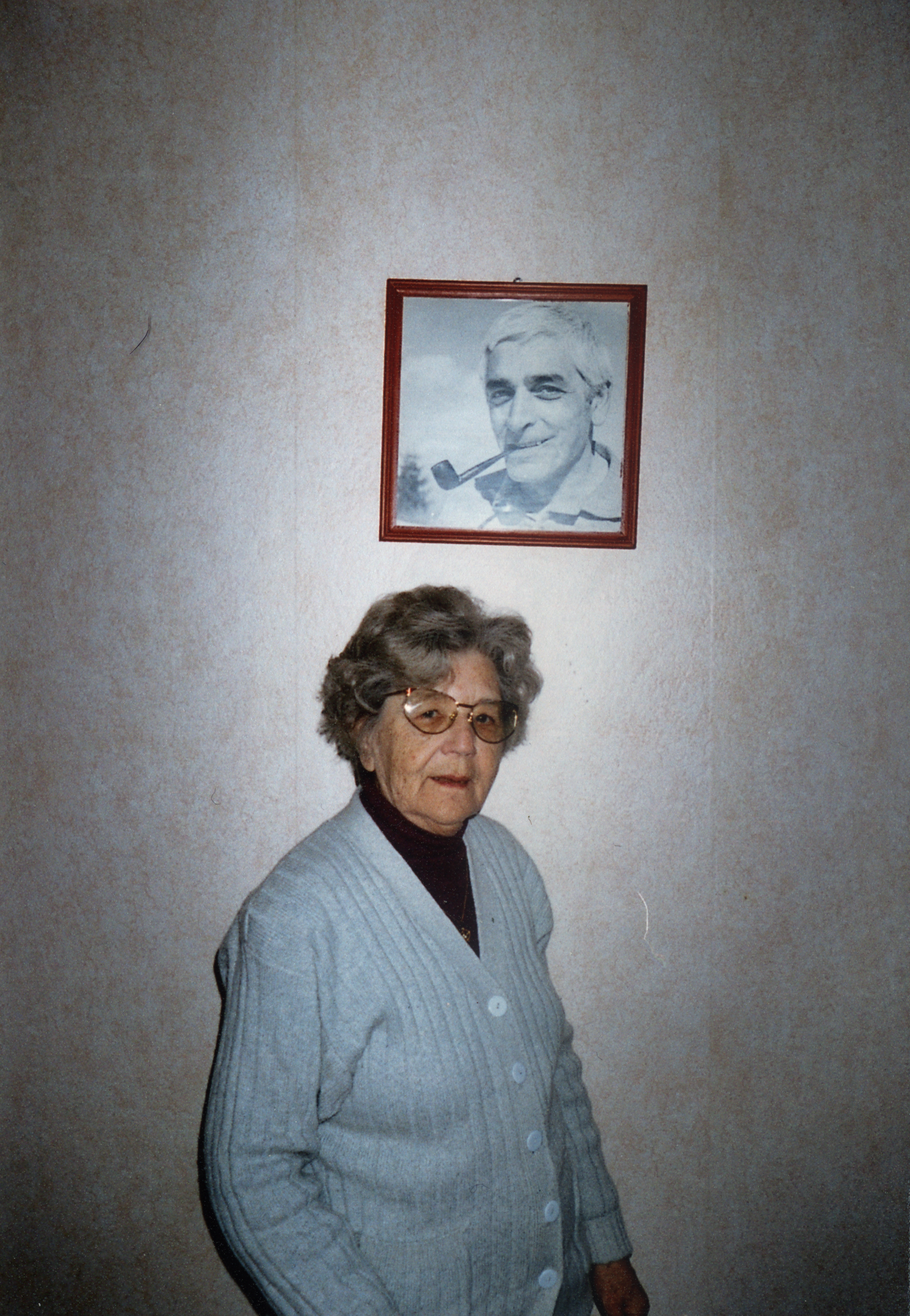Adela Nissimova Levi with her late husband's portrait
Here I am with my late husband David Levi's portrait at our home in Sofia in 2005.
We lived with my husband's parents. They observed some traditions, but we didn't and neither did our daughter. We observed very few of the rituals. We didn't pray, nor go to the synagogue. We married only before the registrar. We settled in our present home in 1968. My husband's parents lived in one of the rooms, my husband and I in the other and my daughter in the living-room. Six months after we moved, my father-in-law died and when my daughter got married she lived here with her husband. In 1976 my grandson was born and my mother-in-law died in 1978. It was always very crowded at home. Now I live alone: from time to time my grandchildren visit me but they live in Dragalevtsi [a village near Sofia, at the foot of the Vitosha Mountain]. My husband died on 6th May 1993, but he was very sick for the last twelve years of his life: he was on hemodialysis. I looked after him, there was no other way. He went to have hemodialysis three times a week, and I took him there and back. My daughter lived here and a year before my husband died we bought a small apartment in the neighboring surroundings. We went to live there and my daughter remained here with the children. But my husband was sick, very sick.
Now I have many friends whom I know and who are very close to me. But I gather mostly with the women. We are around 14. They are colleagues of mine from the places I had worked. From time to time we also invite some of our male colleagues. There are two other Jewish women among us, but all the others are Bulgarians. I get along perfectly well with all of them: we love each other a lot. On Saturdays I go to the Jewish Home, where I'm a member of the 'Golden Age' club: it's for Jews only. I also have friends there. All of my parents' relatives have passed away. When I went to Israel I visited those who were alive. I went six or seven times to Israel. I still keep in touch with my sisters.
I kept in touch with my relatives. We wrote letters to each other and spoke on the phone, which was a luxury then. They called more often. I remember that one of the times my sister and her husband were passing via Bulgaria to go to a Romanian festival, and they called to tell us that they wouldn't pass through Sofia, but through Gorna Oriahovitsa. They asked our mother to go and see them there. My mother was very worried there because she couldn't find them on the platform. They were in a special wagon and weren't allowed to go to Sofia. Those were special festival wagons. They weren't much different from the others, but they were only for the participants in the festival and no other passengers traveled in them. There was some kind of problem and my husband took my mother home. At that time Ivan Bashev was in charge of the Bulgarian representatives in the festival and I was his secretary in 'Narodna Mladezh'. Later, he became Foreign Minister. So we called him and he did everything possible to find my sister in Romania and put her through to my mother so that at least they could speak on the phone.
The democracy in Bulgaria after 1989 affected me very badly. If it hadn't been so I would have visited Israel more times. Until 1993 I was thinking only about my husband. There were problems with his medicines. After that I went twice to Israel but my relatives paid for my expenses. Now I visit the Jewish community. I'm very happy there because I meet with people. And at that age I need contacts because I live alone. I went only twice to the synagogue: to see it restored and on a holiday to see how they celebrate it. Now I don't receive financial aid. Some time ago we received 10-15 levs every month depending on the pension. I think that representatives of Joint visited us. Now such aid is given only to the people with very small pensions. We receive a tranche of 500 dollars or something like that but I don't know from where.
